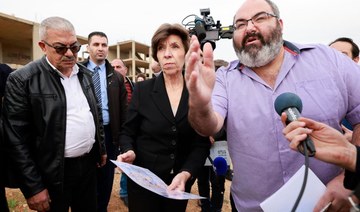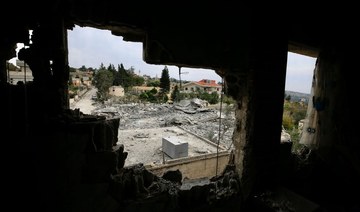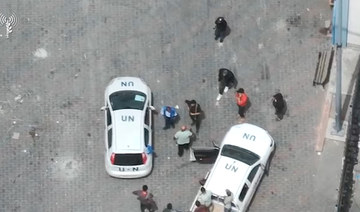BEIRUT: Lebanon is ready to implement a UN resolution that would help end Hezbollah’s cross-border attacks on Israel if Tel Aviv also complies and withdraws from occupied territory, Lebanon’s Prime Minister Najib Mikati said on Friday.
His remarks came as Hezbollah intensified its operations against Israeli military sites amid the heated confrontation on the southern Lebanese front.
UN Security Council Resolution 1701, which ended a 2006 war between Israel and Hezbollah, called for the removal of armed personnel south of Lebanon’s Litani River, except for UN peacekeepers and the Lebanese security forces.
The solution to the latest cross-border hostilities “is the implementation of international resolutions,” including Resolution 1701, Mikati said in his statement.
“We are ready to commit to their implementation, on the condition the Israeli side does the same and withdraws — according to the international laws and resolutions — from occupied territory,” he added.
On Friday, more residents fled their homes in southern Lebanon when Israeli bombing targeted the area.
The UN Development Programme this week published a report providing a preliminary analysis of the impact of the Gaza war on Lebanon and the repercussions of the hostilities in southern Lebanon on the local economy as of Dec. 6.
The report said: “As per the National Council for Scientific Research, or CNRS, 91 towns in Nabatieh and southern Lebanon have faced 1,768 Israeli attacks, including 1,564 airstrikes, 90 incendiary bombs, 62 phosphorus shells, as well as other types of attacks, causing casualties and the displacement of 64,000 civilians scattered across 10 districts.”
The hostilities have directly affected more than 50 villages across four districts — Tyre, Bint Jbeil, Marjayoun and Hasbaya — and destroyed assets and infrastructure, as well as disrupted economic and social services.
Regions that were directly affected by bombing and displacement include all the border villages from Naqoura toward the Shebaa Farms — an area that is 100 km long and 5 km deep.
The Lebanese Ministry of Agriculture reported “the loss of around 47,000 olive trees in the conflict area, representing about 0.44 percent of the total number of olive trees in Lebanon.”
It added that the trees were directly burnt down “due to the use of internationally banned white phosphorous bombs and other explosives.”
The ministry added that the agricultural areas affected by the fires caused by Israel include 97,800 square meters of olive groves, 66,000 square meters of citrus farms and 98,800 square meters of banana farms.
Fires have also ignited in 20,800 square meters of pasture lands.
Moreover, the Agriculture Ministry reported the destruction of a 600-square-meter fodder warehouse and the complete destruction of about 60 agricultural greenhouses.
More than 200,000 birds and chickens and 700 heads of livestock were reported killed, in addition to the destruction of 250 beehives.
In Tyre, fishermen have found it challenging to access fishing grounds due to the conflict.
The report warned that “forest fires caused by white phosphorus bombs significantly impact natural ecosystems, leading to documented incidents of death among mammals, birds and fish.”
It added: “The water infrastructure has been significantly damaged.”
Soil quality in the conflict area had been affected by physical destruction and pollution due to the spread of heavy metals and toxic compounds from explosive weapons, the report said, warning that white phosphorus usage had “further reduced fertility and increased soil acidity.”
Also on Friday, Israeli media reported that a missile and machine gun fire injured several Israeli soldiers on the border with Lebanon.
Israeli media said that “unusual incidents took place on the northern border with Lebanon, and military censorship was imposed on a security event in the north.”
In the afternoon, six missiles were fired from southern Lebanon toward Israeli positions in the Upper Galilee.
Hezbollah announced in the afternoon the targeting of “a gathering of officers and soldiers of the Israeli enemy in Even Menachem with missile weapons, causing confirmed injuries.”
The Lebanese group carried out operations before noon and announced in successive statements that it targeted “a building in the Shomera settlement with a missile launched from Lebanon.”
It then said it had targeted “gatherings of Israeli soldiers in the vicinity of the Shomera barracks with missile and artillery fire, causing direct hits.”
A missile fell near the Nahariya settlement without any sirens sounding.
The Israeli army responded with airstrikes and artillery fire on the Lebanese border area. Jets struck the Labouneh forests south of Naqoura with missiles.
The Israeli shelling of the Ras Naqoura area led to stones flying toward a Lebanese army position in the area. Sirens sounded at the UNIFIL headquarters in Naqoura.
The shelling targeted the outskirts of Aita Al-Shaab, Ramyah, Al-Qawzah, Beit Lif and Jabal Blat near Marwahin, in addition to the outskirts of Tayr Harfa and the Hamoul area in the western sector.
In a statement, the Israeli army said it attacked “military sites as well as terrorist infrastructure of the Hezbollah organization.”
Fighter jets also attacked a series of Hezbollah targets, it added.
Hezbollah mourned two fighters who died in the south: Hussein Ali Ezzedine from the town of Maaroub and Abdul Aziz Ali Maslamani from the town of Al-Shaitiya.
Hezbollah’s Al-Manar channel reported Israeli army soldiers, quoted by the media, as saying that they felt “like sitting ducks on a shooting range” while operating on the border with Lebanon.
The soldiers said: “The pace of events is increasing here; it is a war on everything, and the higher ranks of the army believe everything is fine.”
Mikati: Lebanon ready to apply UN resolution on border if Israel complies
https://arab.news/mx4xy
Mikati: Lebanon ready to apply UN resolution on border if Israel complies

- Southern front sees further escalation as more than 50 villages directly affected
- On Friday, more residents fled their homes in southern Lebanon when Israeli bombing targeted the area
Egypt warns against consequences of Israeli escalation in Gaza

- During talks with Ayman Al-Safadi and Fuad Hussein, FM Shoukry said that there would be negative repercussions for regional stability if Israel continued to escalate its activities in Gaza
- Discussions in Manama took place on the sidelines of an Arabian foreign ministers’ meeting being held in preparation for the Arab Summit
CAIRO: Egypt’s Foreign Minister Sameh Shoukry has warned of dire consequences as a result of Israel escalating its activities in the Gaza Strip.
During talks with his Jordanian and Iraqi counterparts, Ayman Al-Safadi and Fuad Hussein, he also said there would be negative repercussions for the security and stability of the whole region.
The discussion in Manama on Wednesday took place on the sidelines of an Arabian foreign ministers’ meeting being held in preparation for the Arab Summit.
Shoukry talked about Egypt’s efforts to reach an immediate, comprehensive and lasting ceasefire in Gaza and its call for allowing immediate delivery of humanitarian aid.
He also stressed his country’s categorical rejection of any attempts to displace Gazans or kill the Palestinian cause.
He underlined the need to stop targeting civilians, halt Israeli settler violence, and allow aid access in adequate quantities “that meet the needs of our Palestinian brothers.”
During the meeting, Shoukry also reaffirmed Cairo’s support for the stability of Iraq and Jordan and emphasized the importance of implementing directives from the three countries’ leaders to boost cooperation within the framework of the tripartite mechanism.
He said Egypt viewed tripartite cooperation as a way to link the interests of the three countries and maximize common benefits. The discussion also underlined the importance of putting into effect agreed joint projects as soon as possible.
During a separate meeting with Iraqi minister Hussein, Shoukry reiterated the directives of President Abdel Fattah El-Sisi to develop relations between the two countries in various fields.
The Iraqi minister highlighted close historical ties with Egypt that required continued coordination on the various challenges plaguing the region. Hussein also hailed the key role played by Egypt to bring about an end to the crisis in Gaza.
Houthis claim 2 attacks on ships in Red Sea

- Houthi military spokesman Yahya Sarea said that the militia’s naval forces launched an “accurate” missile strike on the US Navy destroyer USS Mason in the Red Sea
- Statement comes a day after US Central Command said that the USS Mason shot down an incoming anti-ship ballistic missile launched by the Houthis
AL-MUKALLA: Yemen’s Houthi militia claimed responsibility on Wednesday for two drone and missile attacks on a US warship and a commercial ship in the Red Sea, vowing to continue striking ships in international seas, mostly near Yemen’s borders, in support of Palestinians.
In a televised broadcast, Houthi military spokesman Yahya Sarea said that the militia’s naval forces launched an “accurate” missile strike on the US Navy destroyer USS Mason in the Red Sea, as well as a combined attack on the Destiny in the Red Sea. Sarea did not specify when Houthis forces assaulted the two ships, or if the militia caused any human casualties or damage. The statement comes a day after US Central Command said that the USS Mason shot down an incoming anti-ship ballistic missile launched by the Houthis from areas under militia control in Yemen on Monday evening.
According to marinetraffic.com, which provides information on ship locations and identities, the Destiny is a Liberian-flagged bulk carrier that left Bangladesh’s Port of Chittagong on March 31 and landed at the Saudi Red Sea port of Jeddah on April 17. The Houthis said they attacked the ship when it reached Israel’s Eilat on April 20, defying militia warnings to ships sailing the Red Sea to avoid the port.
The Houthis have sunk one ship, seized another and launched hundreds of ballistic missiles, drones, and explosive-laden drone boats at International commercial and naval ships in the Gulf of Aden, the Red Sea, and, more recently, the Indian Ocean. The militia claimed its strikes were intended to push Israel to cease its blockade of the Gaza Strip, and that they targeted US and UK ships after the two nations blasted Houthi-controlled regions of Yemen.
On Tuesday, Houthi media said that jets from the US and the UK had launched four strikes on Hodeidah airport in the Red Sea city, the second round of airstrikes on the same airport this week. The US and UK replied to the Houthi Red Sea campaign by unleashing hundreds of airstrikes on Sanaa, Saada, Hodeidah and other Houthi-controlled Yemeni regions. According to the two nations, the strikes prevented many Houthi missile, drone, or drone boat assaults on ships in international seas while significantly weakening Houthi military capabilities.
The US-led Combined Maritime Forces said on Tuesday that Lebanon and Albania joined the international marine coalition as the 44th and 45th members, respectively. “It is a pleasure to welcome both Lebanon and Albania to the Combined Maritime Forces,” US Navy Vice Admiral George Wikoff, the CMF commander, said in a statement. The Bahrain-based CMF is made up of five task teams that protect major maritime waterways such as the Red Sea and the Bab Al-Mandab Strait.
Netanyahu says he hopes Israel can get aid, overcome US disagreements

- Sources said the US State Department moved a $1 billion weapons aid package for Israel into the congressional review process
WASHINGTON: Israel Prime Minister Benjamin Netanyahu said he hoped to receive US military aid and to overcome US President Joe Biden’s pause on certain weapons, vowing to fight Hamas without American support amid what he called a disagreement with Washington.
On Tuesday, sources said the US State Department moved a $1 billion weapons aid package for Israel into the congressional review process. Asked in a CNBC interview that aired on Wednesday if he could confirm the $1 billion package movement, Netanyahu declined to say but added that he appreciates US assistance.
Blinken says Israel needs a clear and concrete plan for Gaza’s future

- “We do not support and will not support an Israeli occupation. We also of course, do not support Hamas governance in Gaza...” Blinken said
- Israel says it intends to keep overall security control and has baulked at proposals for the Palestinian Authority to take charge
KYIV: Israel needs a clear and concrete plan for the future of Gaza where it faces the potential for a power vacuum that could become filled by chaos, US Secretary of State Antony Blinken said on Wednesday.
Washington and its ally Israel say Hamas cannot continue to run Gaza after militants from the group ignited the conflict with attacks on southern Israel that killed 1,200 people on Oct. 7.
“We do not support and will not support an Israeli occupation. We also of course, do not support Hamas governance in Gaza... We’ve seen where that’s led all too many times for the people of Gaza and for Israel. And we also can’t have anarchy and a vacuum that’s likely to be filled by chaos,” Blinken said during a press conference in Kyiv.
The US top diplomat has held numerous talks with Israel’s Arab neighbors on a post-conflict plan for Gaza since Israel vowed to root out Hamas from the Palestinian enclave more than seven months ago.
But Israel says it intends to keep overall security control and has baulked at proposals for the Palestinian Authority, which governs with partial authority in the Israeli-occupied West Bank, to take charge.
“It’s imperative that Israel also do this work and focus on what the future can and must be,” Blinken said. “There needs to be a clear and concrete plan, and we look to Israel to come forward with its ideas.”
Turkiye tells US that Israel’s attack on Rafah unacceptable, Turkish source says

- Fidan also told Blinken that it was important to achieve a ceasefire in Gaza as soon as possible
ANKARA: Turkish Foreign Minister Hakan Fidan told his US counterpart Antony Blinken in a call on Wednesday that Israel’s attack on the Gazan city of Rafah is unacceptable, a Turkish diplomatic source said.
Fidan also told Blinken that it was important to achieve a ceasefire in Gaza as soon as possible, while emphasising that obstacles to the access of humanitarian aid into the enclave must be removed, the source said.






















